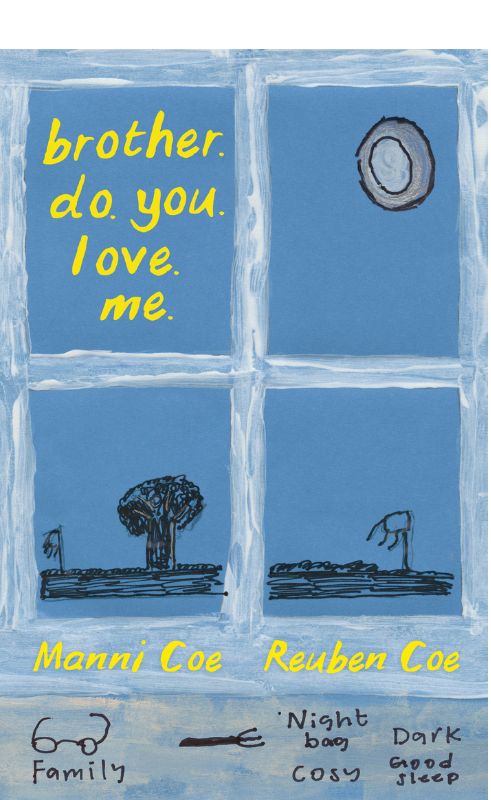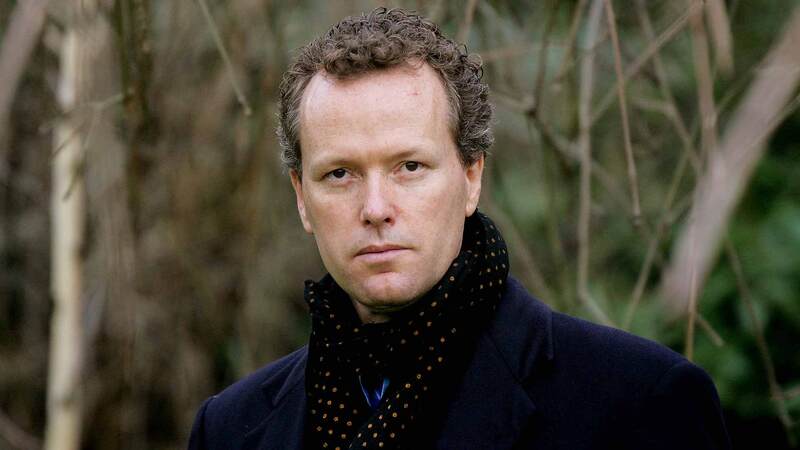You are viewing your 1 free article this month. Login to read more articles.
Manni & Reuben Coe on their evocative and powerful story of brotherhood
 Caroline Sanderson
Caroline SandersonCaroline Sanderson is a non-fiction writer, editor and books journalist. Her books include a travel narrative, A Rambling Fancy: in the F ...more
By sharing their emotionally powerful story of brotherly love, Manni Coe and Reuben Coe have created a magical book they hope will help others.

Caroline Sanderson is a non-fiction writer, editor and books journalist. Her books include a travel narrative, A Rambling Fancy: in the F ...more
At the age of 38, Reuben Coe was living in a care home for adults with learning disabilities. Over the course of a year, including the first months of the pandemic, he had become non-verbal, only able to express his thoughts and feelings by drawing on paper with felt-tip pens. He was deeply depressed and heavily medicated, struggling with the physical reality of having Down’s syndrome and cut off from everyone he loved. A pitiful photo taken at this time shows Reuben at the window of the care home: palm against the glass, his expression anguished. For this previously exuberant and independent man with a BTEC in drama, renowned for his singing, and for dressing up, and for jumping onto a podium and dancing with his shirt off in a gay club in Edinburgh one New Year’s Eve, his psychiatrist predicted only a 10% chance of a return to his former self.
From this wretched situation, Reuben sent a text message to Manni, one of his three older brothers. It read: “brother.do.you.love.me”. Manni, already deeply concerned for his brother’s welfare, took it as a distress signal. He left his home in Andalucía, where he runs an independent travel business, took Reuben out of care and moved them both into a cottage in the countryside in the middle of winter. There they established a gentle daily routine of walks, returning each evening when Reuben would sit and draw. Slowly, as winter turned to spring, Reuben began to heal; and slowly, Manni began to hope for a sustainable and independent future for his brother.
I started the book in February, eight weeks after rescuing Reuben, and before long I was writing about events in real time, sometimes for eight to 10 hours a day
The story of their re-established brotherhood is now the subject of a book—brother.do.you.love.me—which pairs Manni Coe’s spell-binding writing with Reuben’s drawings. These carry cargoes of meaning. There are sad lions (Aslan and “The Lion King” are inspirations) and hearts that say “love you brother”; portraits of Whoopi Goldberg (one of his favourite actors) and characters from “The Lord of the Rings”. The sober cover image is Reuben’s evocation of what it felt like, looking out of his window while shut away on his own for up to 10 hours a day, for three long months.
A room with a view
I meet the brothers, who grew up in Yorkshire and Berkshire, at the flat where Reuben now lives in a small town in Dorset. On the first floor, with beautiful long-range views—or “flews” as Reuben irresistibly calls them—of Thomas Hardy countryside, its décor reflects his love of animals, rainbows, film and songs. While Reuben still speaks only occasionally and quietly, he has written thoughtful answers in a notebook to questions I sent to Manni in advance. These answers are complemented throughout our interview by animated gestures and facial expressions, which convey what a funny and sensitive man Reuben is.
Because what you need to understand is that Reuben lives in a grey area somewhere between reality and fantasy; where everything becomes a song, or a film, or a reference to a musical. When you’re with him, you inhabit that space too
brother.do.you.love.me has an extraordinary emotional immediacy, born of the fact that once Manni began writing it, the book became a compulsion. “I’ve always written for pleasure, including poetry, and there’s also a novel in a box at home in Spain. But I just knew that this story was one that had to be written. I started the book in February, eight weeks after rescuing Reuben, and before long I was writing about events in real time, sometimes for eight to 10 hours a day.” As the written narrative took shape, Reuben’s drawings began to tell a parallel story of brotherly love and healing. “Reuben still wasn’t talking at all,” remembers Manni. “But every single night he would do a drawing; give me a kiss and then hand it to me upside down.” Those captioned illustrations began to dictate the narrative, because, as Manni puts it, they “net Reuben’s emotions so effectively”.
Late spring 2021 brought the promise of a new beginning for Reuben, who, restored to something of his former self, had the possibility of moving into the supported living flat that is now home. But it wasn’t a simple transition and frustrating delays galvanised Manni to seek publication for their almost completed book. He approached numerous agents but none responded. “So then I decided to try the power of social media. On the Monday morning, I wrote a Facebook post which said: ‘Guys, we’ve written a book because Reuben and I have a story that we believe should be told. Help me. Does anyone know anyone in the publishing world?’” The post was widely shared and as a result the brothers were quickly introduced to Gracie and Adrian Cooper of Little Toller. “By Wednesday we were sitting in their garden having coffee and croissants, while Gracie looked at the stash of 200 drawings that Reuben had brought and Adrian read the text. And then they looked at each other and I knew they were saying, ‘Yes.’”
Spending time with Manni and Reuben and observing their sparky and deeply intuitive relationship first-hand is a humbling joy. It is also a lesson for me in slow interviewing—of watching and listening carefully. In response to my question: “How do you feel about lots of people reading your story?”, Reuben has written the words: “The Color Purple”. Manni explains that during early lockdown restrictions, which meant he and Reuben could only meet for a socially distanced walk, with masks on and with the theme music pumping from Manni’s car, they acted out the emotional scene at the end of the film of “The Color Purple” (starring the aforementioned Goldberg) where sisters Celie and Nettie are reunited after many years apart. “I was trying to use his favourite scenes from films to help pull Reuben through. At the time, it didn’t work; he just thought I was being a fool. But I sent him the video of us acting out that scene because I knew that later he would watch it and it would help him hold onto the fact that one day we would be reunited. Because what you need to understand is that Reuben lives in a grey area somewhere between reality and fantasy; where everything becomes a song, or a film, or a reference to a musical. When you’re with him, you inhabit that space too.”
Extract
I gather up his Darth Vader suitcase and his Union Jack holdall from the boot—cow shit has already splattered the car’s paintwork. I stand and wait for him to get out. He takes an age to readjust his hat and put his Tommy Hilfiger day bag and his Joseph and the Technicolour Dreamcoat tote bag over his shoulder—there was such fire in his eyes when we bought it after the show, spilling out into the crowds on Argyll Street.
He turns and I lean forward to help him out of the car, but he pauses to check that he has his paintbrush (in his right pocket) and his broken glasses (left pocket) before he puts his feet on the gravel drive. He knows this place—an old agricultural worker’s cottage, semi-detached, that used to be part of the farm. I don’t hurry him. He walks to the door as if he never wants to get there.
“Welcome back to The Shire, Frodo,” I say before we get to the threshold. “Shoes off please.”
Part of the emotional power of brother.do.you.love.me is that it transports the reader into this magical space. And that is Reuben’s gift. While this is a book about how we take care of each other in any context, it also has something profound to communicate about those made vulnerable by society’s tendency to view such gifts as limitations. In answer to my question about what he’d like us to remember after reading his book, Reuben, a man with the heart and courage of the lions he so loves to draw, writes: “Help people”.










